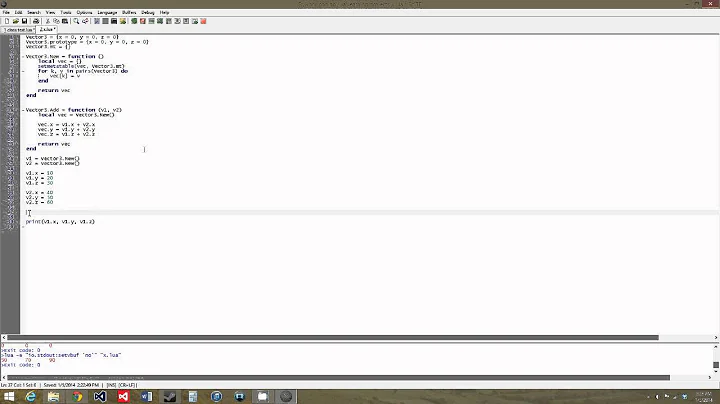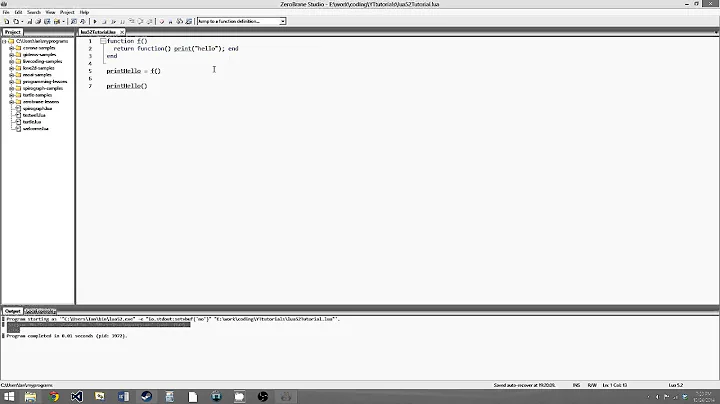Case-insensitive Lua pattern-matching
Solution 1
Try something like this:
function case_insensitive_pattern(pattern)
-- find an optional '%' (group 1) followed by any character (group 2)
local p = pattern:gsub("(%%?)(.)", function(percent, letter)
if percent ~= "" or not letter:match("%a") then
-- if the '%' matched, or `letter` is not a letter, return "as is"
return percent .. letter
else
-- else, return a case-insensitive character class of the matched letter
return string.format("[%s%s]", letter:lower(), letter:upper())
end
end)
return p
end
print(case_insensitive_pattern("xyz = %d+ or %% end"))
which prints:
[xX][yY][zZ] = %d+ [oO][rR] %% [eE][nN][dD]
Solution 2
Lua 5.1, LPeg v0.12
do
local p = re.compile([[
pattern <- ( {b} / {escaped} / brackets / other)+
b <- "%b" . .
escaped <- "%" .
brackets <- { "[" ([^]%]+ / escaped)* "]" }
other <- [^[%]+ -> cases
]], {
cases = function(str) return (str:gsub('%a',function(a) return '['..a:lower()..a:upper()..']' end)) end
})
local pb = re.compile([[
pattern <- ( {b} / {escaped} / brackets / other)+
b <- "%b" . .
escaped <- "%" .
brackets <- {: {"["} ({escaped} / bcases)* {"]"} :}
bcases <- [^]%]+ -> bcases
other <- [^[%]+ -> cases
]], {
cases = function(str) return (str:gsub('%a',function(a) return '['..a:lower()..a:upper()..']' end)) end
, bcases = function(str) return (str:gsub('%a',function(a) return a:lower()..a:upper() end)) end
})
function iPattern(pattern,brackets)
('sanity check'):find(pattern)
return table.concat({re.match(pattern, brackets and pb or p)})
end
end
local test = '[ab%c%]d%%]+ o%%r %bnm'
print(iPattern(test)) -- [ab%c%]d%%]+ [oO]%%[rR] %bnm
print(iPattern(test,true)) -- [aAbB%c%]dD%%]+ [oO]%%[rR] %bnm
print(('qwe [%D]% O%r n---m asd'):match(iPattern(test, true))) -- %D]% O%r n---m
Pure Lua version:
It is necessary to analyze all the characters in the string to convert it into a correct pattern because Lua patterns do not have alternations like in regexps (abc|something).
function iPattern(pattern, brackets)
('sanity check'):find(pattern)
local tmp = {}
local i=1
while i <= #pattern do -- 'for' don't let change counter
local char = pattern:sub(i,i) -- current char
if char == '%' then
tmp[#tmp+1] = char -- add to tmp table
i=i+1 -- next char position
char = pattern:sub(i,i)
tmp[#tmp+1] = char
if char == 'b' then -- '%bxy' - add next 2 chars
tmp[#tmp+1] = pattern:sub(i+1,i+2)
i=i+2
end
elseif char=='[' then -- brackets
tmp[#tmp+1] = char
i = i+1
while i <= #pattern do
char = pattern:sub(i,i)
if char == '%' then -- no '%bxy' inside brackets
tmp[#tmp+1] = char
tmp[#tmp+1] = pattern:sub(i+1,i+1)
i = i+1
elseif char:match("%a") then -- letter
tmp[#tmp+1] = not brackets and char or char:lower()..char:upper()
else -- something else
tmp[#tmp+1] = char
end
if char==']' then break end -- close bracket
i = i+1
end
elseif char:match("%a") then -- letter
tmp[#tmp+1] = '['..char:lower()..char:upper()..']'
else
tmp[#tmp+1] = char -- something else
end
i=i+1
end
return table.concat(tmp)
end
local test = '[ab%c%]d%%]+ o%%r %bnm'
print(iPattern(test)) -- [ab%c%]d%%]+ [oO]%%[rR] %bnm
print(iPattern(test,true)) -- [aAbB%c%]dD%%]+ [oO]%%[rR] %bnm
print(('qwe [%D]% O%r n---m asd'):match(iPattern(test, true))) -- %D]% O%r n---m
Related videos on Youtube
Nubbychadnezzar
Updated on September 15, 2022Comments
-
 Nubbychadnezzar 8 months
Nubbychadnezzar 8 monthsI'm writing a grep utility in Lua for our mobile devices running Windows CE 6/7, but I've run into some issues implementing case-insensitive match patterns. The obvious solution of converting everything to uppercase (or lower) does not work so simply due to the character classes.
The only other thing I can think of is converting the literals in the pattern itself to uppercase.
Here's what I have so far:
function toUpperPattern(instr) -- Check first character if string.find(instr, "^%l") then instr = string.upper(string.sub(instr, 1, 1)) .. string.sub(instr, 2) end -- Check the rest of the pattern while 1 do local a, b, str = string.find(instr, "[^%%](%l+)") if not a then break end if str then instr = string.sub(instr, 1, a) .. string.upper(string.sub(instr, a+1, b)) .. string.sub(instr, b + 1) end end return instr endI hate to admit how long it took to get even that far, and I can still see right away there are going to be problems with things like escaped percent signs '%%'
I figured this must be a fairly common issue, but I can't seem to find much on the topic. Are there any easier (or at least complete) ways to do this? I'm starting to go crazy here... Hoping you Lua gurus out there can enlighten me!
-
 Mud almost 11 yearsAwesome. I was drawing a blank. BTW: you can say
Mud almost 11 yearsAwesome. I was drawing a blank. BTW: you can saypattern:gsubjust as you saidletter:lower. You could even say('[%s%s]'):formatbut that's a little weirder. -
 Bart Kiers almost 11 yearsYeah,
Bart Kiers almost 11 yearsYeah,string.format(...)looks more familiar than('[%s%s]'):format(...), but I like thepattern:gsub(...)better! Thanks. -
 Nubbychadnezzar almost 11 yearsIncredible. But one question... How does that not convert something like
Nubbychadnezzar almost 11 yearsIncredible. But one question... How does that not convert something like%%testto%%[tT]est? Is that match skipped because the previous iteration would have matched both '%%'? Maybe my brain is just a little fried today :/ -
 Bart Kiers almost 11 years@Nubbychadnezzar,
Bart Kiers almost 11 years@Nubbychadnezzar,%%testgets converted to%%[tT][eE][sS][tT]. Once a pattern has matched, it will never be a part of another match. So%%testhas 5 matches:%%,t,e,sandt.%%remains the same, and the letters are converted to[tT],[eE], ... -
 Nubbychadnezzar almost 11 years@Bart "Once a pattern has matched, it will never be a part of another match." That's exactly what I needed to hear. Failing to grasp that was the primary source of my frustration! Thanks!
Nubbychadnezzar almost 11 years@Bart "Once a pattern has matched, it will never be a part of another match." That's exactly what I needed to hear. Failing to grasp that was the primary source of my frustration! Thanks! -
 Stomp over 10 yearsNote: This function can't currently handle patterns that contain square brackets. For example, "The answer is [ABCD]".
Stomp over 10 yearsNote: This function can't currently handle patterns that contain square brackets. For example, "The answer is [ABCD]".







![[Demo] Lua Autocmd Patterns](vi/HR1dKKrOmDs/hq720_sqp--oaymwEcCNAFEJQDSFXyq4qpAw4IARUAAIhCGAFwAcABBg---rs-AOn4CLDdr0DagjIg9KxGaa_myPgaiB9YWg.jpg)



